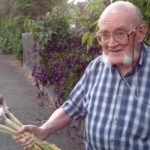Interviewer: Samuel Schmieding
Interview Date: May 8, 2014
Location: Corvallis, Oregon
Duration: 2:07:01
Bill Ferrell was Professor of Forest Ecology at Oregon State University and the principal mentor of Jerry Franklin, as Franklin fondly recalled in seminars he gave. Ferrell begins the interview recounting his early childhood near Akron, Ohio, and exposure to nature via Boy Scout and family activities, including bird watching in the Spring migration period. He was impressed by the poor air quality in the city and the impact of strip mining for coal on terrestrial and, especially, stream systems. He recounts his academic training in forestry at Michigan and then Duke for both graduate degrees, interrupted by military service in Southeast Asia along the way. He taught briefly at University of Idaho before becoming a professor at OSU. He goes on to describe aspects of being a professor and dealing with students and deans. He outlines his teaching approach and philosophy and his focus on field experience. He states that he and Jerry Franklin share not only a love of forests and forest ecology, but also model railroading.
Ferrell comments on his impressions of the Andrews Forest, including how nothing much “earth-shaking” was taking place there early on (late 1950s), but it did provide a range of stand conditions for research. He describes his student Franklin as challenging for some of the “old geezers” because of his independence, but he encouraged him to push his ideas. He also speaks positively of Mark Harmon and his monumental 200-year log decomposition study and his commitment to long-term research in forest ecology. Ferrell goes on to say that, although he operated with a great deal of independence, he found himself at odds with some old faculty members with a strong focus on timber production.
Bill’s son, Steve, joined the discussion, which turns to the time in the 1980s (Bill was retired) when Bill was teaching at Northern Arizona University and had differences of opinion with a prominent professor there, Wally Covington, who promoted intensive forest restoration activities. Ferrell offers critical comments on the clearcutting practices of the Timber Era in the Pacific Northwest. Then the conversation addresses issues related to use of pesticides in forest management and issues related to environmental protection and public health, some recollections on early workers at the Andrews Forest, and war stories from Southeast Asia. Bill’s son, Steve, discusses how his father interacted with students in an open conversation style rather than in a lecture format. The interview closes with reflections about hiking in the High Cascades – a favorite place.
Dublin Core
Title
Description
Ferrell comments on his impressions of the Andrews Forest, including how nothing much “earth-shaking” was taking place there early on (late 1950s), but it did provide a range of stand conditions for research. He describes his student Franklin as challenging for some of the “old geezers” because of his independence, but he encouraged him to push his ideas. He also speaks positively of Mark Harmon and his monumental 200-year log decomposition study and his commitment to long-term research in forest ecology. Ferrell goes on to say that, although he operated with a great deal of independence, he found himself at odds with some old faculty members with a strong focus on timber production.
Bill’s son, Steve, joined the discussion, which turns to the time in the 1980s (Bill was retired) when Bill was teaching at Northern Arizona University and had differences of opinion with a prominent professor there, Wally Covington, who promoted intensive forest restoration activities. Ferrell offers critical comments on the clearcutting practices of the Timber Era in the Pacific Northwest. Then the conversation addresses issues related to use of pesticides in forest management and issues related to environmental protection and public health, some recollections on early workers at the Andrews Forest, and war stories from Southeast Asia. Bill’s son, Steve, discusses how his father interacted with students in an open conversation style rather than in a lecture format. The interview closes with reflections about hiking in the High Cascades – a favorite place.

